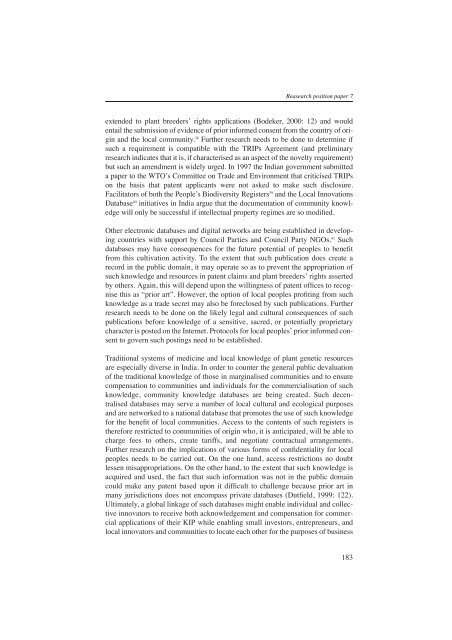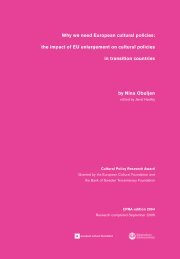Tony Bennett, Differing diversities - Council of Europe
Tony Bennett, Differing diversities - Council of Europe
Tony Bennett, Differing diversities - Council of Europe
You also want an ePaper? Increase the reach of your titles
YUMPU automatically turns print PDFs into web optimized ePapers that Google loves.
Reasearch position paper 7extended to plant breeders’ rights applications (Bodeker, 2000: 12) and wouldentail the submission <strong>of</strong> evidence <strong>of</strong> prior informed consent from the country <strong>of</strong> originand the local community. 38 Further research needs to be done to determine ifsuch a requirement is compatible with the TRIPs Agreement (and preliminaryresearch indicates that it is, if characterised as an aspect <strong>of</strong> the novelty requirement)but such an amendment is widely urged. In 1997 the Indian government submitteda paper to the WTO’s Committee on Trade and Environment that criticised TRIPson the basis that patent applicants were not asked to make such disclosure.Facilitators <strong>of</strong> both the People’s Biodiversity Registers 39 and the Local InnovationsDatabase 40 initiatives in India argue that the documentation <strong>of</strong> community knowledgewill only be successful if intellectual property regimes are so modified.Other electronic databases and digital networks are being established in developingcountries with support by <strong>Council</strong> Parties and <strong>Council</strong> Party NGOs. 41 Suchdatabases may have consequences for the future potential <strong>of</strong> peoples to benefitfrom this cultivation activity. To the extent that such publication does create arecord in the public domain, it may operate so as to prevent the appropriation <strong>of</strong>such knowledge and resources in patent claims and plant breeders’ rights assertedby others. Again, this will depend upon the willingness <strong>of</strong> patent <strong>of</strong>fices to recognisethis as “prior art”. However, the option <strong>of</strong> local peoples pr<strong>of</strong>iting from suchknowledge as a trade secret may also be foreclosed by such publications. Furtherresearch needs to be done on the likely legal and cultural consequences <strong>of</strong> suchpublications before knowledge <strong>of</strong> a sensitive, sacred, or potentially proprietarycharacter is posted on the Internet. Protocols for local peoples’ prior informed consentto govern such postings need to be established.Traditional systems <strong>of</strong> medicine and local knowledge <strong>of</strong> plant genetic resourcesare especially diverse in India. In order to counter the general public devaluation<strong>of</strong> the traditional knowledge <strong>of</strong> those in marginalised communities and to ensurecompensation to communities and individuals for the commercialisation <strong>of</strong> suchknowledge, community knowledge databases are being created. Such decentraliseddatabases may serve a number <strong>of</strong> local cultural and ecological purposesand are networked to a national database that promotes the use <strong>of</strong> such knowledgefor the benefit <strong>of</strong> local communities. Access to the contents <strong>of</strong> such registers istherefore restricted to communities <strong>of</strong> origin who, it is anticipated, will be able tocharge fees to others, create tariffs, and negotiate contractual arrangements.Further research on the implications <strong>of</strong> various forms <strong>of</strong> confidentiality for localpeoples needs to be carried out. On the one hand, access restrictions no doubtlessen misappropriations. On the other hand, to the extent that such knowledge isacquired and used, the fact that such information was not in the public domaincould make any patent based upon it difficult to challenge because prior art inmany jurisdictions does not encompass private databases (Dutfield, 1999: 122).Ultimately, a global linkage <strong>of</strong> such databases might enable individual and collectiveinnovators to receive both acknowledgement and compensation for commercialapplications <strong>of</strong> their KIP while enabling small investors, entrepreneurs, andlocal innovators and communities to locate each other for the purposes <strong>of</strong> business183














